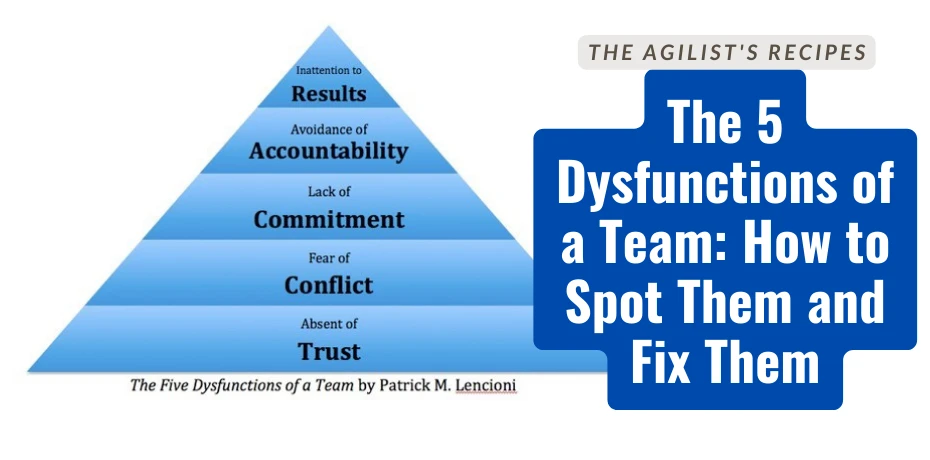Do you ever feel like your team isn't quite clicking?
Like everyone's doing their own thing and not working together as a cohesive unit?
You're definitely not alone.
Even the best teams can struggle with dysfunction.
The 5 Dysfunctions of a Team by Patrick Lencioni still hold true today.
Here are the five dysfunctions, and how to spot them in your own team:
1. Lack of Trust: Team members are unwilling to be vulnerable and open with each other. They don't trust each other to review their work, share information, or doubt each others' skills. They avoid sharing anything about themselves.
2. Fear of Conflict: Team members are not saying what they're thinking, fearing judgment, keeping silence, not sharing the problems along the way, avoiding healthy conflict out of a fear of damaging relationships or being perceived negatively.
3. Lack of Commitment: Team members are doing whatever they're told, not caring about their goals, and doing tasks just for the sake of those. Without healthy conflict, they may not fully commit to decisions made by the team.
4. Avoidance of Accountability: Team members are not taking responsibility for the work they do, avoiding making decisions and sticking to them, and not knowing who is doing what. Without commitment, team members may avoid taking responsibility for their work, leading to missed goals, finger-pointing, and a lack of trust and cohesion within the team.
5. Inattention to Results: Team members are not knowing what and how to measure their work, what are the actual outcomes they create, doing fast work without having the bigger picture in mind, and leaving a lot of space for revisions later on. Team members prioritize individual needs over team goals, leading to a lack of focus on achieving results.
But don't worry, we've got some solutions for you!
Here's what you can do as a leader:
- Be aware of the situation and acknowledge the dysfunction
- Intentionally identify the best solution for the situation
- Determine to act, create a plan of action, and involve others in the process
- Measure the progress and success to ensure the desired outcome is achieved
To handle Absence of Trust:
- Learn to use different simple social bonding activities for improving team cohesion and creating trust.
- Learn about different personality type assessment tools.
- Understand how to provide honest and constructive feedback and measure psychological safety.
- Understand the importance of regular team health assessments.
To handle Fear of Conflict:
- Understand how to acknowledge the conflict.
- Learn how to identify different levels of conflict and how to de-escalate and manage those to reach a positive conflict level and collaboration to solve.
To handle Lack of Commitment:
- Run a simple exercise to address the importance of effective communication within your team.
- Use a powerful decision-making technique to encourage participants to consider a problem or decision from multiple perspectives.
- Learn how to set smart goals, OKRs, and actions.
- Use User Story Mapping to break down complex issues into simple and clear ones.
To handle Avoidance of Accountability:
- Develop strategies to create and communicate clear working agreements for teams.
- Use strategies and matrixes to create and communicate clear role and responsibility definitions for teams.
- Learn different strategies to run effective retrospectives.
To handle Inattention to Results:
- Learn how to define a product development value stream and what to pay attention to.
- Learn what to measure and how to get data.
- Learn how to run a value stream mapping workshop for your team/company.
Now all those solutions are part of our newly released course: Ultimate Team Performance Toolkit.
It includes over 30 team performance and health strategies, exercises, and templates that you can use to measure and improve team dynamics and performance.
Want to learn how to use those in practice?
Grab the link today!
And for the first 100 buyers, we're offering it at a founding price of $99. So don't miss out on this opportunity to take your team to the next level.
I hope you found it helpful!
===
Whenever you're ready, there are 4 other ways I can help you:
1. Follow me on Linkedin to get daily tips on #agile, #team coaching, #scrum master growth, #agile leadership, #agilecoaching #culture
2. 💥Join our free community to taste our recipes to help you grow as an agilist and help your teams improve performance!
3. Join the Ultimate Team Performance Toolkit: a compound collection of 30 exercises, templates and strategies to measure and improve team dynamics and performance.
4. Join the Agile Team Coaching Program: A targeted coaching- facilitation system to help Scrum Masters and Agile Leaders to identify team hidden obstacles and turn those into a growth plan in 30-60 days.

